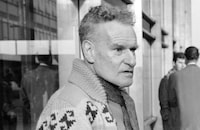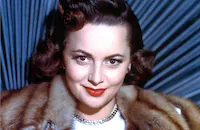After years as a matinee idol in comedies and romances, Dirk Bogarde - often dubbed the British Rock Hudson - demonstrated his dramatic chops as a British nobleman whose life of ease is threatened by accusations that he's really an imposter. His triple role (or is it?) as the British lord, a look-alike actor and the man one of them may have become in a World War II POW camp led to more challenging roles for the British star. He would go on to win the British Academy Award as the sinister butler in Joseph Losey's The Servant (1963) and a straying husband in John Schlessinger's Darling (1965).
For Bogarde's leading lady, Olivia de Havilland, Libel brought her the kind of glamorous part she had hoped to settle into when she re-located to Paris in the mid-50s. Not only did she get to trot out her best stage diction as the proper British lady led to doubt her own husband, but she got the producers to hire Christian Dior to design her costumes. But her transformation into a grande dame may have been too much too fast. As the New York Times critic noted, she seemed to be "balancing Big Ben on her hat." The performance would come back to haunt her in future years, with other critics complaining that she seemed to be giving testimonials rather than acting.
But any qualms about the leading lady were more than balanced by the quality MGM and producer Anatole de Grunwald brought to the production. Director Anthony Asquith had distinguished himself in the early years of talking films as England's only serious rival to Alfred Hitchcock. He had brought George Bernard Shaw to the screen with smashing results when he co-directed Pygmalion (1938) with the film's star, Leslie Howard. Grunwald's co-writer, Karl Tunberg, was an MGM contract writer with another major credit to his name that year, the studio's blockbuster epic Ben-Hur (1959). And cinematographer Robert Krasker was returning to the kind of moody black-and-white photography that had brought him an OscarÆ in 1949 for The Third Man.
As the opposing barristers, Asquith cast two of England's best character actors. Prosecuting attorney Robert Morley had won an OscarÆ nomination as Louis XVI in MGM's lavish Marie Antoinette (1938) and would go on to acclaimed roles as Katharine Hepburn's brother in The African Queen (1951) and the eccentric food critic in Who Is Killing the Great Chefs of Europe? (1978). At the defense table was Wilfrid Hyde-White, who had worked with Asquith on The Demi-Paradise (1943) and The Winslow Boy (1948), but is probably best remembered as Col. Pickering in the musical version of Pygmalion, My Fair Lady (1964). Making her film debut in Libel is Millicent Martin, future star of the hit musical Side by Side by Sondheim and Lili Faversham on Days of Our Lives. Also near the bottom of the cast list is Robert Shaw, the acclaimed actor and playwright who would score as Henry VIII in A Man for All Seasons (1966) and as Captain Quint in Jaws (1975).
Director: Anthony Asquith
Producer: Anatole de Grunwald
Screenplay: Anatole de Grunwald & Karl Tunberg
Based on the play by Edward Wooll
Cinematography: Robert Krasker
Art Direction: Paul Sheriff
Music: Ben Frankel
Cast: Dirk Bogarde (Sir Mark Loddon, Frank Welney, Prisoner No.15), Olivia de Havilland (Lady Maggie Loddon), Paul Massie (Jeffrey Buckenham), Robert Morley (Sir Wilfred), Wilfrid Hyde-White (Hubert Foxley), Millicent Martin (Maisie), Robert Shaw (1st Photographer).
BW-100m. Letterboxed.
by Frank Miller



























